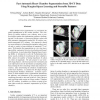Free Online Productivity Tools
i2Speak
i2Symbol
i2OCR
iTex2Img
iWeb2Print
iWeb2Shot
i2Type
iPdf2Split
iPdf2Merge
i2Bopomofo
i2Arabic
i2Style
i2Image
i2PDF
iLatex2Rtf
Sci2ools
141
click to vote
ICCV
2007
IEEE
2007
IEEE
Fast Automatic Heart Chamber Segmentation from 3D CT Data Using Marginal Space Learning and Steerable Features
Multi-chamber heart segmentation is a prerequisite for global quantification of the cardiac function. The complexity of cardiac anatomy, poor contrast, noise or motion artifacts makes this segmentation problem a challenging task. In this paper, we present an efficient, robust, and fully automatic segmentation method for 3D cardiac computed tomography (CT) volumes. Our approach is based on recent advances in learning discriminative object models and we exploit a large database of annotated CT volumes. We formulate the segmentation as a two step learning problem: anatomical structure localization and boundary delineation. A novel algorithm, Marginal Space Learning (MSL), is introduced to solve the 9-dimensional similarity search problem for localizing the heart chambers. MSL reduces the number of testing hypotheses by about six orders of magnitude. We also propose to use steerable image features, which incorporate the orientation and scale information into the distribution of sampling...
Automatic Segmentation | Automatic Segmentation Method | Computer Vision | ICCV 2007 | Multi-chamber Heart Segmentation |
Related Content
| Added | 03 Jun 2010 |
| Updated | 03 Jun 2010 |
| Type | Conference |
| Year | 2007 |
| Where | ICCV |
| Authors | Yefeng Zheng, Adrian Barbu, Bogdan Georgescu, Michael Scheuering, Dorin Comaniciu |
Comments (0)

